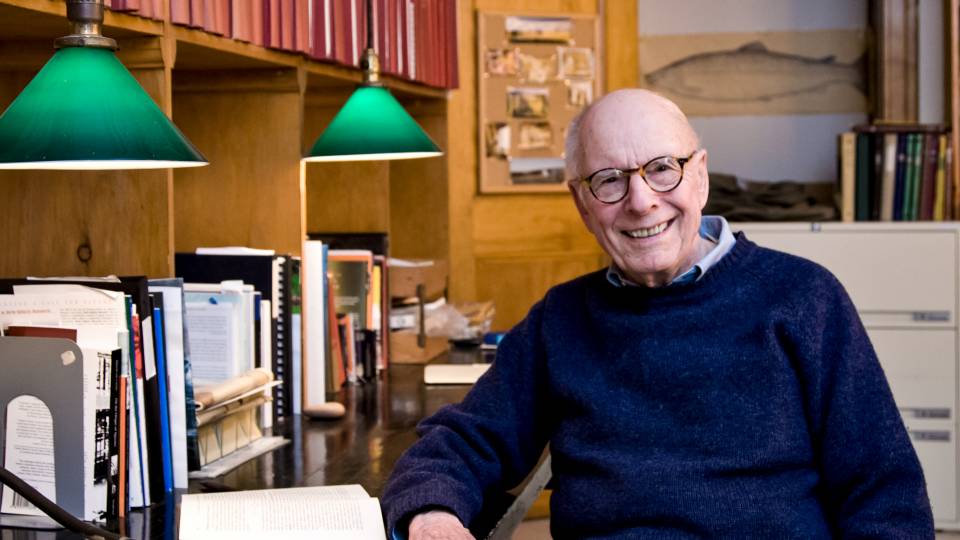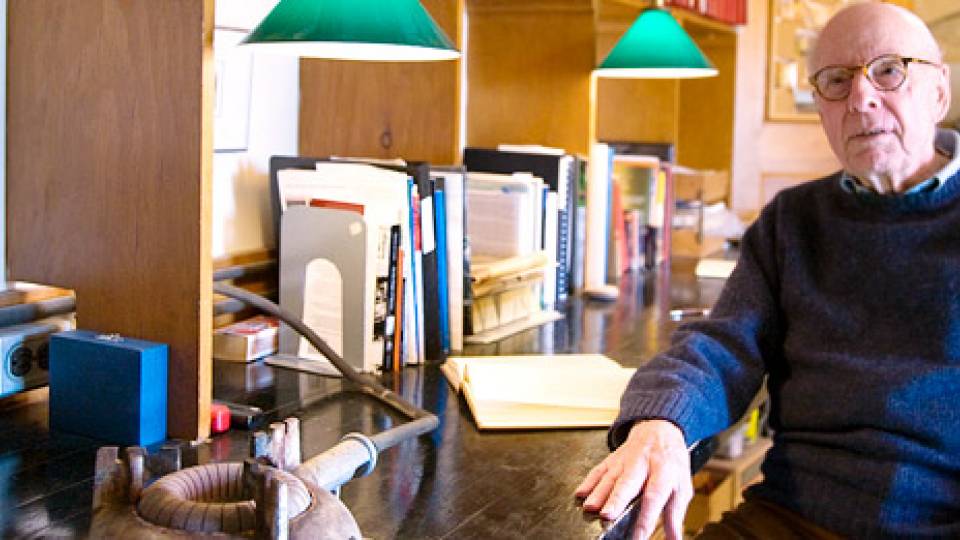Princeton University awarded honorary degrees during Commencement
exercises June 6 to six distinguished individuals for their
contributions to science, health care, athletics, literature, education
and civil rights.
Princeton President Shirley M. Tilghman awarded degrees to John Bonner,
Princeton's George Moffett Professor of Biology Emeritus; Paul Farmer,
medical anthropologist, physician and founding director of the
international organization Partners In Health; Mia Hamm, U.S. women's
soccer legend; Seamus Heaney, Nobel laureate poet, translator and
essayist; Freeman Hrabowski III, president of the University of
Maryland-Baltimore County; and Dolores Huerta, co-founder of the United
Farm Workers of America.
Honorary degree recipients are elected by Princeton's Board of
Trustees. A trustee committee, which includes faculty and students,
solicits nominations from the entire University.
The following is biographical information on the recipients and the official citations.
John Bonner, Doctor of Science
John Bonner, the George Moffett Professor of Biology Emeritus, joined
the Princeton faculty in 1947. Primarily interested in evolution and
development, Bonner for half a century has used the cellular slime mold
Dictyostelium as a tool to seek an understanding of those twin
disciplines. His investigations of the development of organisms have
broadened scientists' understanding of the problems of growth and cell
differentiation.
Bonner served as chair of Princeton's Department of Biology before his
retirement in 1990, fostering the work of the group of scientists that
later became the Department of Ecology and Evolutionary Biology. He has
written more than 150 scholarly journal articles and numerous books,
including "The Evolution of Culture in Animals," "The Evolution of
Complexity by Means of Natural Selection" and "Lives of a Biologist:
Adventures in a Century of Extraordinary Science." His latest
monograph, "Why Size Matters: From Bacteria to Blue Whales," has just
been published. He is a member of the American Philosophical Society
and the National Academy of Sciences and a fellow of the American
Academy of Arts and Sciences and the American Association for the
Advancement of Science. Bonner is the recipient of a Sheldon Traveling
Fellowship, a Rockefeller Traveling Fellowship and a Guggenheim
Fellowship.
An unabashed champion of Darwin, he continues a highly productive
lifetime of scholarship in a sustained attempt to explain nature to
himself and others. At Princeton for almost six decades, he has been a
generous colleague, a gentle but effective administrator, an inspiring
teacher, a determined antireductionist and a teller of tales whose
gracefully written and highly accessible essays have successfully
focused our attention on the "big" questions of science, including why
size matters. A devotee of the slime mold Dictyostelium, he has used
this simple organism to explore the complex mysteries of life, raising
our understanding of central issues of biology to a higher level.
Paul Farmer, Doctor of Laws
Medical anthropologist and physician Paul Farmer is a founding director
of Partners In Health, an international organization that provides
direct health care services and undertakes research and advocacy
activities on behalf of those who are sick and living in poverty.
Focusing primarily on diseases that disproportionately afflict the
poor, Farmer has worked with colleagues around the world in pioneering
novel, community-based treatment strategies for AIDS and tuberculosis.
Farmer is the Presley Professor of Medical Anthropology in the
Department of Social Medicine at Harvard University Medical School. In
addition, he is an attending physician in infectious diseases and chief
of the Division of Social Medicine and Health Inequalities at Brigham
and Women's Hospital in Boston and medical director of a charity
hospital, the Clinique Bon Sauveur, in rural Haiti. Farmer is the
author of "Pathologies of Power" and "Infections and Inequalities," and
he is the subject of Pulitzer Prize-winner Tracy Kidder's "Mountains
Beyond Mountains: The Quest of Dr. Paul Farmer, a Man Who Would Cure
the World." His awards and honors include the Margaret Mead Award from
the American Anthropological Association, the American Medical
Association's Outstanding International Physician (Nathan Davis) Award
and the Heinz Humanitarian Award.
In the service of all nations, from rural Haiti to war-torn Rwanda
to inner-city Boston, this anthropologist-physician has devoted his
significant talents to saving lives. He would give those who have next
to nothing the inestimable gift of health, and he would challenge all
of us to make that gift a basic human right. Epidemics of tuberculosis
and AIDS teach us that global public health depends on community
efforts that cross geo-political borders. His prescription for social
justice includes attention to the social forces, from poverty and
racism to war, that weaken our immune systems; his crusade aims to
secure better health not only for the body, but for the body politic.
Mia Hamm, Doctor of Humanities
Mariel Margaret (Mia) Hamm, an American soccer legend, is considered
one of the best women ever to have played the world's most popular
sport and is widely credited with attracting millions of women and
girls to the sport as players, spectators and professional athletes. At
age 15, she began a 17-year career when she was selected as the
youngest woman ever to play with the U.S. national team. In college,
she led the University of North Carolina-Chapel Hill to four NCAA
women's championships. In 1991, she was the youngest player on the
first U.S. team to win the women's World Cup. When the U.S. squad won
the World Cup again in 1999, more than 90,000 spectators attended the
final match, making it the most-attended women’s sports event ever.
In 1996 and 2004, Hamm led the U.S. teams that won Olympic gold medals
and twice, in 2001 and 2002, she was named the world player of the
year. She was Soccer USA's female athlete of the year five times and
won numerous most valuable player and other awards. As the best-known
female athlete in the United States with a reputation for
sportsmanship, determination and high aspirations, she tirelessly
promoted women's athletics, the sport of soccer and greater
opportunities for participation. She retired in 2004 with 158
international goals, more than 50 ahead of any other player, male or
female. In 1999, she created the Mia Hamm Foundation to raise funds and
awareness for bone marrow disease research and transplant patients, and
to encourage and support the further development of opportunities for
young women to participate in sports.
For men and women around the world, but especially for girls in this
country, she has personified the achievement of excellence, the
expansion of opportunity and the determination needed to overcome
defenders of opponents' nets and limitations on the participation of
women in sports. Because of her, many have dreamed what they otherwise
would not have dared to dream, and have set out to realize their dreams
by following her model of courage, integrity, discipline, good
sportsmanship and effective teamwork. Her own playing days securely
lodged in the record books, she now aims for goals that can bring
health, hope and new opportunities to others.
Seamus Heaney, Doctor of Letters
Poet, translator and essayist Seamus Heaney was awarded the 1995 Nobel
Prize for literature "for works of lyrical beauty and ethical depth,
which exalt everyday miracles and the living past." As part of what
became known as the "Northern School" of Irish poetry in the 1960s, he
published his first book of poetry, "Death of a Naturalist," 40 years
ago. Since then, he has written award-winning collections of poetry and
essays, and translated works that range from the Anglo-Saxon poem
"Beowulf" to the tragedies of Sophocles. His latest book of poetry,
"District and Circle," was published this spring. Growing up in
Northern Ireland, Heaney experienced for more than a quarter century
the sectarian violence that marked the religious strife between
Protestants and Catholics. His poetry and essays reflect a deep
consciousness of the poet's social obligations, as in "The Redress of
Poetry."
Heaney held the Chair of Poetry at Oxford University from 1989 to 1994
and has taught throughout his career at his alma mater, Queen's
University, Belfast. He also has taught at the University of
California-Berkeley and at Harvard University, where he was the
Boylston Professor of Rhetoric and Oratory from 1984 to 1996 and now
serves as the Ralph Waldo Emerson Poet-in-Residence.
In the 40 years since the publication of his first collection of
poems, he has established himself as the foremost poet writing in
English. His writings move the heart and stir the conscience. He has an
unprecedented, and unparalleled, ability to make words equal to the
world, and the world to words, so that one may not insert so much as a
knifepoint between the two. To reapply Samuel Beckett’s aperçu on James
Joyce, one might justly propose that his "writing is not about
something; it is that something itself."
Freeman Hrabowski III, Doctor of Laws
Freeman Hrabowski's research, publications and life's work focus on
science and mathematics education, with special emphasis on nurturing a
new generation of minorities in those fields. Hrabowski pursues these
goals as president of the University of Maryland-Baltimore County, a
position he has held since 1992. High school students from around the
United States become part of UMBC's Meyerhoff Scholars program, and 90
percent of the students enrolled in that program graduate in math,
engineering or the sciences. Ninety percent of those who graduate go on
to graduate school.
Hrabowski is the co-author of "Overcoming the Odds: Raising
Academically Successful African American Young Women" and "Beating the
Odds: Raising Academically Successful African American Males." He has
been a member of the boards of the Baltimore Museum of Art and the
Baltimore Community Foundation. He serves as a consultant to the
National Science Foundation, the National Institutes of Health and
universities and school systems nationally. Hrabowski is a member of
numerous civic and educational boards, including the Carnegie
Foundation for the Advancement of Teaching, the Urban Institute and the
Leadership Enterprise for a Diverse America.
Jailed at 12 along with hundreds of other children for participating
in the Birmingham Children's March, he helped bring an end to the reign
of a racist police commissioner. Losing a best friend in the 16th
Street Baptist Church bombing of 1963, he helped Spike Lee tell the
story in the 1997 documentary "Four Little Girls." Beating the odds
himself with a summa cum laude degree in mathematics at 19 and his
Ph.D. by 24, he has spent his life teaching that the best weapon is
knowledge and the best training ground is the classroom and research
lab. His programs to nurture and support young African Americans have
helped them succeed in unprecedented numbers, proving his theorem that
it is "cool to be smart."
Dolores Huerta, Doctor of Laws
The daughter of a miner, farm worker and union organizer, Dolores
Huerta has been a labor activist since co-founding the United Farm
Workers of America union in 1962 with César Chávez. Huerta, who grew up
in Stockton, Calif., studied education at Delta Community College and
began teaching elementary school. Troubled by the poverty she saw among
her students, many of them children of Latino farm workers, she gave up
her teaching career to advocate full time on behalf of those in her
community, beginning an activist career that continues to this day.
In the 1970s, successive strikes by the UFW led to passage of the
Agricultural Labor Relations Act, which guaranteed the rights of
California farm workers to organize and hold elections on the question
of union representation and required growers to bargain in good faith
if workers voted for a union. That victory was followed by battles that
eventually gave farm workers disability insurance, bilingual voting
ballots and unemployment assistance. Her advocacy for legislation
granting amnesty for farm workers who were working and paying taxes in
the United States helped pass the Immigration Reform and Control Act of
1986. She also has fought to ban the use of toxic pesticides on crops.
In 2003, Huerta received the Puffin/Nation Prize for Creative
Citizenship in recognition of almost 50 years of work for farm workers'
rights, challenging the status quo "through distinctive, courageous,
imaginative, socially responsible work of significance." She used the
prize to establish the Dolores Huerta Foundation, which focuses on
community organizing and leadership training in low-income,
underrepresented communities. Her other awards include induction into
the National Women's Hall of Fame, the Ellis Island Medal of Freedom
Award and the Congressional Hispanic Caucus Institute's Medallion of
Excellence for community service.
Outraged by the daily specter of students too hungry to learn, she
traded the classroom for the picket line. A courageous labor activist,
she co-founded the United Farm Workers of America to ensure that those
who work to feed us have the wherewithal to feed themselves and their
families. An inspired civil rights activist, she rewrote California's
legal compact with its farm workers and gave voiceless communities a
voice -- in Spanish and English -- through ballot drives and lobbying
efforts. Through her insatiable hunger for justice -- La Causa -- and
her tireless advocacy, she has devoted her life to creative,
compassionate and committed citizenship.


